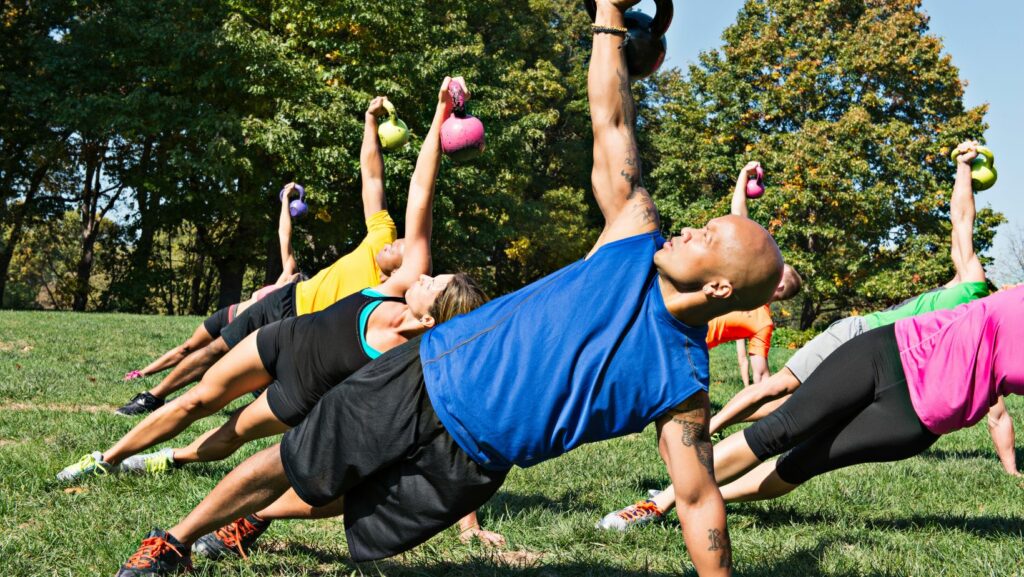 Sports, Fitness or Recreation Jobs
Sports, Fitness or Recreation Jobs
- Growing Demand: The sports, fitness, and recreation job market is expanding rapidly, projected to grow by 23% from 2021 to 2031, highlighting a significant need for skilled professionals.
- Diverse Career Opportunities: A wide range of roles exists, including personal trainers, sports coaches, fitness instructors, and recreation directors, catering to various interests and skill sets.
- Essential Skills and Certifications: Success in this field often requires certifications such as Certified Personal Trainer (CPT), Group Fitness Instructor credentials, and CPR/First Aid, alongside relevant educational backgrounds.
- Integration of Technology: The rise of digital fitness solutions and wearable technology is transforming the industry, presenting new career paths and increasing demand for tech-savvy professionals.
- Positive Community Impact: Careers in this sector contribute to community health and well-being, allowing individuals to make a significant difference in people’s lives through fitness and recreational activities.
- Job Satisfaction and Flexibility: Working in sports, fitness, or recreation provides not only job fulfillment from helping others but also offers flexible work arrangements and opportunities for career advancement.
In a world increasingly focused on health and wellness, sports, fitness, and recreation jobs are booming. These careers not only promote physical activity but also foster community engagement and personal development. From personal trainers to sports coaches, the opportunities are diverse and rewarding, appealing to those passionate about helping others achieve their fitness goals.
As the demand for healthier lifestyles rises, so does the need for skilled professionals in these fields. Whether it’s guiding a yoga class or managing a recreational facility, individuals in these roles play a vital part in enhancing the quality of life. With the right skills and certifications, anyone can turn their passion for fitness into a fulfilling career that makes a difference.
Overview of Sports, Fitness or Recreation Jobs
Sports, fitness, and recreation jobs encompass a wide range of roles that support physical health and community well-being. Opportunities exist in various settings, including gyms, schools, parks, and sports organizations. Each position plays a crucial role in encouraging active lifestyles and fostering social connections.
Key Job Roles
- Personal Trainers – Personal trainers design and implement individualized fitness programs to help clients achieve specific health goals. They assess fitness levels and provide guidance on exercise techniques.

- Sports Coaches – Sports coaches focus on developing athletic skills, teamwork, and strategy among players. They often work in schools and local clubs, contributing to athletes’ growth both physically and mentally.
- Fitness Instructors – Fitness instructors lead group exercise classes, offering direction and motivation. They create diverse workouts that cater to various fitness levels and interests.
- Recreation Directors – Recreation directors manage programs and activities in community centers and parks. They organize events, promote community engagement, and oversee staff to ensure high-quality recreational opportunities.
- Exercise Physiologists – Exercise physiologists develop exercise plans for patients with chronic conditions. They monitor progress and adapt programs to improve health outcomes.
Industry Trends
The sports, fitness, and recreation industry has seen a shift towards personalized services and technology integration. The rise of digital fitness solutions, such as virtual classes and mobile apps, reflects consumers’ increasing desire for convenience and tailored experiences. Additionally, growing awareness of mental health’s connection to physical activity has influenced job roles in the sector.
Required Skills and Certifications
An array of qualifications supports success in this field. Common certifications include:
- Certified Personal Trainer (CPT) by organizations such as NASM or ACE.
- Group Fitness Instructor credentials, enabling individuals to lead various classes.
- CPR and First Aid Certification, essential for ensuring client safety.
Investing in relevant education and certifications prepares individuals for a fulfilling career in sports, fitness, and recreation, aligning their professional aspirations with community health objectives.
Types of Careers in Sports, Fitness or Recreation
Numerous careers exist in the sports, fitness, and recreation sectors. Each offers unique opportunities to promote health and well-being through various roles.
Coaching and Training Positions
Coaching and training positions focus on developing athletes and fitness enthusiasts. Key roles include:
- Personal Trainers: They create customized workout plans and motivate clients to achieve their fitness goals.
- Sports Coaches: They instruct and guide teams or individuals in specific sports, enhancing skills and teamwork.
- Group Fitness Instructors: They lead group classes such as yoga, Zumba, or cycling, fostering motivation and camaraderie.
- Performance Coaches: They specialize in optimizing an athlete’s physical performance through tailored training regimens.
These positions require strong communication skills and a comprehensive understanding of fitness principles.
Management and Administration Roles
Management and administration roles ensure the smooth operation of sports and fitness facilities. Key positions include:
- Recreation Directors: They oversee community recreational programs, developing initiatives that enhance community engagement.
- Fitness Center Managers: They manage day-to-day operations of gyms or fitness centers, focusing on member satisfaction and staff supervision.
- Event Coordinators: They organize and promote sports or fitness events, coordinating logistics and marketing strategies.
These roles demand excellent organizational skills and the ability to lead teams effectively.
Health and Wellness Careers
Health and wellness careers focus on promoting overall well-being through fitness and preventative health. Key roles include:
- Exercise Physiologists: They assess individuals’ fitness levels and develop exercise programs tailored to specific health needs.
- Health Coaches: They guide clients in achieving lifestyle changes related to nutrition and exercise, enhancing overall wellness.
- Sports Nutritionists: They provide dietary advice to athletes and active individuals, optimizing performance through proper nutrition.
These careers require a strong foundation in health sciences and an understanding of lifestyle modifications.
Required Skills and Qualifications
Professionals aiming for careers in sports, fitness, and recreation must possess a combination of relevant skills and qualifications. The following outlines critical aspects needed to excel in this industry.
Educational Requirements
Education varies by specific job roles within the sports, fitness, and recreation fields. Most entry-level positions require at least a high school diploma. Many roles, such as exercise physiologists and health coaches, necessitate a bachelor’s degree in fields like kinesiology, exercise science, or physical education. Advanced degrees may be beneficial for individuals seeking higher positions or specialized roles, such as sports management or physical therapy.
Certifications and Licenses
Certifications are essential for demonstrating expertise and credibility in the sports and fitness sector. Key certifications include:
- Certified Personal Trainer (CPT): Offered by organizations like the National Academy of Sports Medicine (NASM) or the American Council on Exercise (ACE).
- Group Fitness Instructor (GFI): Recognized credentials from institutions like the Aerobics and Fitness Association of America (AFAA).
- CPR and First Aid Certification: Increasingly important for personal trainers and fitness instructors to ensure client safety.
Obtaining these certifications not only enhances career prospects but also aligns with industry standards, ensuring professionals provide effective and safe services to their clients.
Job Market Trends and Opportunities
The sports, fitness, and recreation sectors experience significant growth, driven by an increasing focus on health and wellness. Employment in these fields is projected to rise by 23% from 2021 to 2031, much faster than the average for all occupations. This growth reflects heightened awareness of the benefits of physical activity and the demand for professionals who facilitate these experiences.
Emerging job opportunities include positions in specialized fitness programs, wellness coaching, and community health initiatives. Employers seek professionals who offer tailored fitness solutions and promote holistic health approaches. Examples include health coaches who focus on individualized wellness plans and group fitness instructors who create engaging classes.
Technological advancements continue to influence the market, with fitness apps and wearable devices gaining popularity. These tools offer new career paths in fitness technology, such as digital personal training or fitness app development. Integrating technology into health programs enhances engagement and allows for greater personalization, appealing to a tech-savvy demographic.
The emphasis on mental health has created opportunities in stress management and mindfulness-based fitness programs. Professionals who can combine physical training with mental wellness support find increased demand in both corporate settings and personal wellness practices. This trend encourages fitness professionals to gain additional certifications in mental health awareness and coaching.
Networking opportunities have expanded through online platforms and professional organizations, allowing individuals in the sports and fitness fields to connect more easily. Joining groups focused on fitness trends or community health initiatives fosters collaboration and guidance among like-minded professionals.
Overall, the job market continues to evolve, providing diverse opportunities for those passionate about sports, fitness, and recreation. By adapting to these trends and enhancing relevant skills, individuals position themselves for successful careers that promote well-being in various communities.
Benefits of Working in Sports, Fitness or Recreation
Working in sports, fitness, or recreation offers numerous benefits that enhance personal and professional growth.
Physical Activity and Health
Engaging in physically active roles promotes overall health. Employees regularly participate in exercise, which leads to improved fitness levels and reduced stress. Being active fosters a healthier lifestyle, making it easier to inspire clients and the community.
Flexible Work Environment
Many roles in this industry provide flexibility in scheduling. Fitness instructors, personal trainers, and recreational coordinators can often set their hours, accommodating personal commitments. This flexibility enhances work-life balance.
Job Satisfaction and Fulfillment
Professionals in the field experience a high level of job satisfaction. Helping individuals achieve fitness goals or promoting community well-being offers a sense of fulfillment. Witnessing clients’ progress and positive lifestyle changes brings significant rewards.
Networking Opportunities
The sports and fitness industry encourages networking among professionals. Attending workshops, conferences, and community events fosters connections. Building a professional network creates opportunities for collaboration and career advancement.
Career Growth and Advancement
Multiple career advancement paths exist within the sports, fitness, and recreation sectors. Professionals can evolve from entry-level roles to management positions or specialized areas. Continuous education and networking enhance career prospects.
Diverse Career Options
A variety of career options within the industry allows individuals to find their niche. Roles include personal trainer, sports coach, fitness director, and recreation manager, catering to different interests and skills. This diversity accommodates varying career aspirations.
Positive Community Impact
Working in sports, fitness, or recreation cultivates positive community engagement. Professionals contribute to community health initiatives that improve the quality of life. Playing a role in promoting physical activity fosters healthier, connected communities.
Technology Integration
The integration of technology into the industry introduces innovative tools and resources. Fitness apps and wearable devices enhance client engagement and training effectiveness. Professionals adept in these technologies gain a competitive edge in the job market.
Overall, the benefits of working in sports, fitness, or recreation are substantial and diverse, supporting numerous aspects of personal and professional development.
Passion with Purpose
The sports, fitness, and recreation sectors present a wealth of opportunities for those looking to make a meaningful impact. With a growing emphasis on health and wellness, professionals in this field can find rewarding careers that not only foster personal growth but also enhance community well-being.
As the industry evolves, staying informed about trends and obtaining relevant certifications will be crucial for success. Whether one chooses to coach, manage, or promote health, each role plays a vital part in helping individuals achieve their fitness goals. Embracing this dynamic landscape opens doors to a fulfilling career path that aligns passion with purpose.



